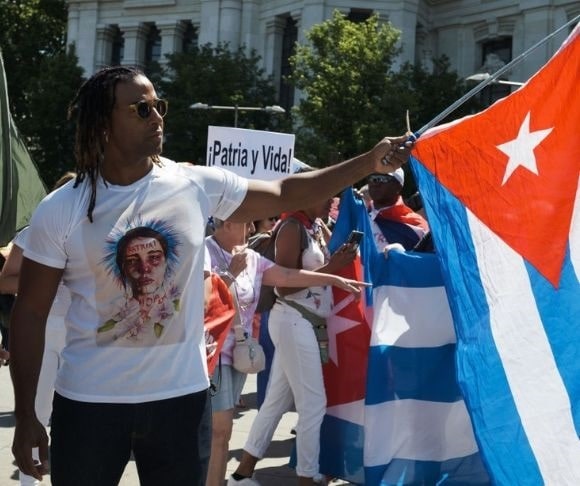A Cuban revolution in 2021? The island nation’s economic and political collapse had been in the making long before the coronavirus pandemic seemingly exacerbated its plight. From food shortages to deteriorating health care infrastructure, Cuba has been on the brink of national indigence for many years. The Castro revolutionaries might desire equal outcomes, but the only equality among the communists in Havana has been the equality of suffering. So, the question is now: If Cubans, after years of apathy, are waking up to the odious nature and failed results of socialism, will current and future governments worldwide reject a philosophy that should have been left behind in the previous century? If the gulags of the Soviet Union, the Cultural Revolution of Mao’s China, and the Killing Fields of Pol Pot’s Cambodia have not dissuaded even the most mature of academics from the ailments of socialism, why would Cuba’s uprising be different?
Why Are Cubans Protesting?
Cries of “Down with the dictatorship,” “Enough,” and “We are not afraid” are filling Cuba’s antique and dilapidated roads, corners, and alleyways as thousands of desperate citizens demand an end to the authoritarian regime. An impoverished nation often described as a time capsule from the 1950s, everything about Cuba is as old, failing to capture a drop from the fountain of youth – or from advanced economies. Even its economic policies are something from an outdated Soviet textbook, which explains the intensifying humanitarian crisis.
Cuba’s deteriorating food conditions have been reported before. Because Havana had been running out of food, the government instituted a nationwide rationing program for common items, such as beans, chicken, eggs, and rice. Officials had placed the blame on former President Donald Trump’s heightened trade embargo, but entrepreneurs alluded to price controls, production quotas, and collectivized agriculture as the chief sources of declining inventories.
The COVID-19 public health crisis exacerbated the food crisis. The government had imported two-thirds of its food, and most of the costs were paid for by its booming tourism sector. With travel restrictions in place, policymakers could no longer afford the $2 billion for household staples. As a result, President Miguel Diaz-Canel has encouraged the population to grow their food, even on their balconies. But price controls and private ownership restrictions remain intact, and that might be the most significant hurdle to no longer going hungry.
Soaring price inflation is another issue for Cuba. If consumers are fortunate enough to find milk or pork, these items are almost impossible to purchase because of skyrocketing costs. Prices have spiked as much as 900% this year, while the government has devalued the peso by 24% to spur economic growth. The president conceded that the mechanism was not a “magic solution,” but it would “favor the creation of the necessary conditions to advance in a more solid manner.” So far, neither businesses nor consumers have benefited from the destructive monetary policy intervention.
But other non-economic problems are popping up throughout Cuba, too. A shortage of medicines and supplies for treatable illnesses, a paucity of COVID-19 vaccines, and a disintegrating health care infrastructure are all elements contributing to the uprising. The Wall Street Journal reported that scabies, an infestation of the skin by the human itch mite, is spreading across the socialist state. It is curable with antibodies and topical medicines, but medical care providers do not have these remedies in their possession. In hospitals, patients are lying in beds in the hallway, abandoned in the dark. Contrary to Michael Moore’s Sicko, the Cuban medical system is not the envy of the world.
Will This Trigger a Cuban Spring?
 The Arab Spring that began in Tunisia triggered a ripple effect throughout the Muslim world. Will the Cuban demonstrations lead to comparable events in either Latin American or socialist countries? From Colombia to Argentina and Venezuela, malfunctioning leadership and dysfunctional policies have established horrific conditions for millions of people. The energy crisis in Caracas, the inflationary catastrophe in Buenos Aires, and the widespread poverty for a third of the population in Bogota might warrant anti-government demonstrations comparable to what is transpiring in Cuba. Be it a rejection of socialism or the leadership, the Havana protests could be a powder keg waiting to go off in Latin America.
The Arab Spring that began in Tunisia triggered a ripple effect throughout the Muslim world. Will the Cuban demonstrations lead to comparable events in either Latin American or socialist countries? From Colombia to Argentina and Venezuela, malfunctioning leadership and dysfunctional policies have established horrific conditions for millions of people. The energy crisis in Caracas, the inflationary catastrophe in Buenos Aires, and the widespread poverty for a third of the population in Bogota might warrant anti-government demonstrations comparable to what is transpiring in Cuba. Be it a rejection of socialism or the leadership, the Havana protests could be a powder keg waiting to go off in Latin America.
The Demise of Socialist Dogma?
As fortunate Americans walk the streets sporting a hip Che Guevara T-shirt and sipping a Starbucks latte, gabbing to their friends about socialism, unfortunate Cubans have been forced to take to the streets to demand the bare necessities. After decades of socialist policies and a communist regime, many Cubans are finally rising up against a government that has been the sole cause of food shortages, a lack of medical supplies, and even missing coronavirus vaccines. Once again, a country that has embraced socialist orthodoxy is experiencing poverty and civil unrest. Will the world ever study the past? Will this be the final nail in the ideology’s coffin? As eminent economist Milton Friedman famously said, “Governments never learn. Only people do.”
~
Read more from Andrew Moran.




